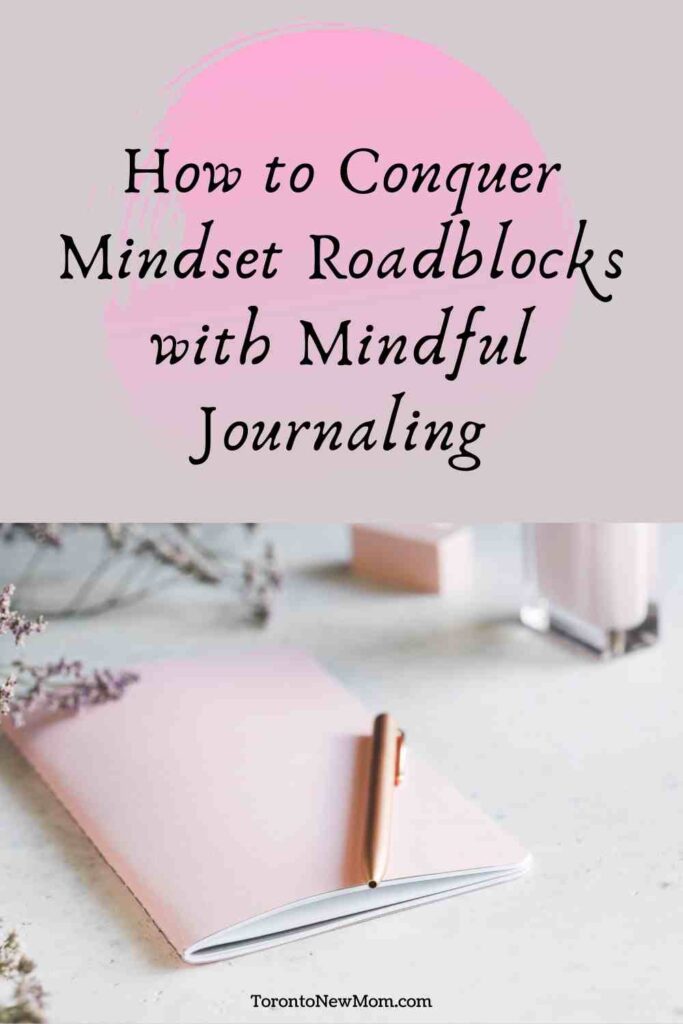
How to Conquer Mindset Roadblocks with Mindful Journaling
You’ve had a trying day! With online learning, working from home and all the other responsibilities that come your way, it’s hard to find any time to reflect and address your feelings, let alone your thoughts.
However, if you can find 10-15 minutes at the end of the day to do a mindful brain dump to get all your thoughts and feelings out of your head and onto paper, I guarantee that you will feel a whole lot better for it!
What is Mindful Journaling?
Mindful journaling is an opportunity to acknowledge, raise awareness and accept whatever is right for you in the present moment. Whether that’s anger, sadness, frustration, doubt – it’s a simple way to gain clarity about roadblocks that are holding us back. When we do this, we’re better able to deal with them.
Journaling is beneficial for several reasons. It’s perhaps best for personal growth, breaking down barriers, and getting to know the truth of who you are, as well as your feelings about specific areas of your life, which in my humble opinion, is a worthwhile goal.
Here are some common roadblocks that journaling can help address and overcome.
Money Roadblocks
Perhaps the most valuable tool in the fight against money roadblocks is your budget, but there’s no need to make your budget and your journaling entirely separate entities. After all, tracking your spending is similar to journaling, and tracking down your thoughts on your budgeting progress can help you find out what works best for you.
Furthermore, tracking your financial roadblocks is about uncovering your relationship with money itself. By journaling about it, you’ll be better able to find out what’s holding you back and how to improve in the future. Even if it takes time to make the progress you’re seeking, journaling about money lets you spend the rest of your time focused on goals or priorities.
Here is an example journal prompt for identifying your current money blocks:
- How would you describe your relationship with money in seven words or less
Self-Doubt or Imposter Syndrome
No one wants to admit that they lack confidence, experience feelings of insecurity, inadequacy, or fear. The good news is that journaling is an excellent technique for breaking down these roadblocks to bring these feelings to light and always reframe old thought loops and transform them into positive ways of thinking.
Perhaps the most common type of insecurity is imposter syndrome. It is common among people who don’t feel like they belong or deserve to be in a particular field. By tracking downtimes when your feelings of insecurity or imposter syndrome pop up, you’ll be able to craft an action plan for accepting these feelings and letting them pass promptly.
A journal prompt that you might consider to help you overcome self-doubt or imposter syndrome is to focus on your list of success and wins instead of your shortcomings.
A question you might consider for this particular category could be as simple as:
- What are my successes?
Merely acknowledging that imposter syndrome is a part of your life lets you recognize intrusive feelings for what they are. While feelings of insecurity may never go away entirely, you can become aware of your triggers through mindful journaling. Still, you can start to build up a repertoire of all the things you have accomplished and have succeeded at instead of all the things you have not.
Productivity Roadblocks
People often joke about procrastination, but productivity roadblocks are a significant issue for many, especially in the digital era. If you have a bullet journal, consider making quick notes about your progress during the day and times when you’re unable to be at your best. Look for patterns and find ways to set yourself in an ideal environment for success.
If you view low productivity as a significant setback, consider setting aside a few minutes every night, looking back at what you think held you around during the day. Focus on the positive as well. A few minutes in the morning covering how you intend to be productive can set you on a course for success. Try listing the three most important tasks that you MUST finish that day, and you’ll stay very day workday focused and determined.
Journaling is a powerful tool, and it helps us uncover what we need to succeed in our personal and professional lives. If you, like most people, are currently being held back by roadblocks, make sure to use journaling as a way to uncover roadblocks, form actionable plans, and thrive.
An example of some journal prompts that could be useful for overcoming productivity roadblocks is:
- How do you currently deal with lack of motivation?
- How would you like to deal with your lack of motivation?
- What’s stopping you from connecting with the latter part of the person you described when you’re struggling to stay motivated?
Mindful Journaling– Find your Purpose
In such a fast-paced society, it’s easy to understand why someone may find themselves feeling misaligned to the reasons why they do what they do every day. In other words, I’m talking about your WHY or purpose. Your why is often the reason, the motivation or the core of why you do what you do, and what inspires you to keep going even when things get complicated, both personally and professionally. It’s what fires you up & excites you.
Your WHY is the place where your values, passions, talents, and skills come together.
When you need to get crystal clear on your life’s purpose, and improve your relationship with yourself, consider the following journal prompt:
- What are the one things I feel genuinely most excited about?

Mindful journaling is one of the best ways to bring awareness to the thoughts in your head, to explore new ideas or revelations and to address your feelings without having to buffer or sensor for an audience.
Do you journal, and if so, when is the best time for you to journal? I’d love to know! Feel free to comment below or reach out to [email protected]
Until next time, happy journaling!
Brenda

- Things to Do in West Palm Beach with Kids - February 8, 2026
- 5 Tips to Boost Your Child’s Immune System - February 5, 2026
- Exploring Miami with Kids: A Canadian Family’s Winter Escape - January 6, 2026



Facebook Comments